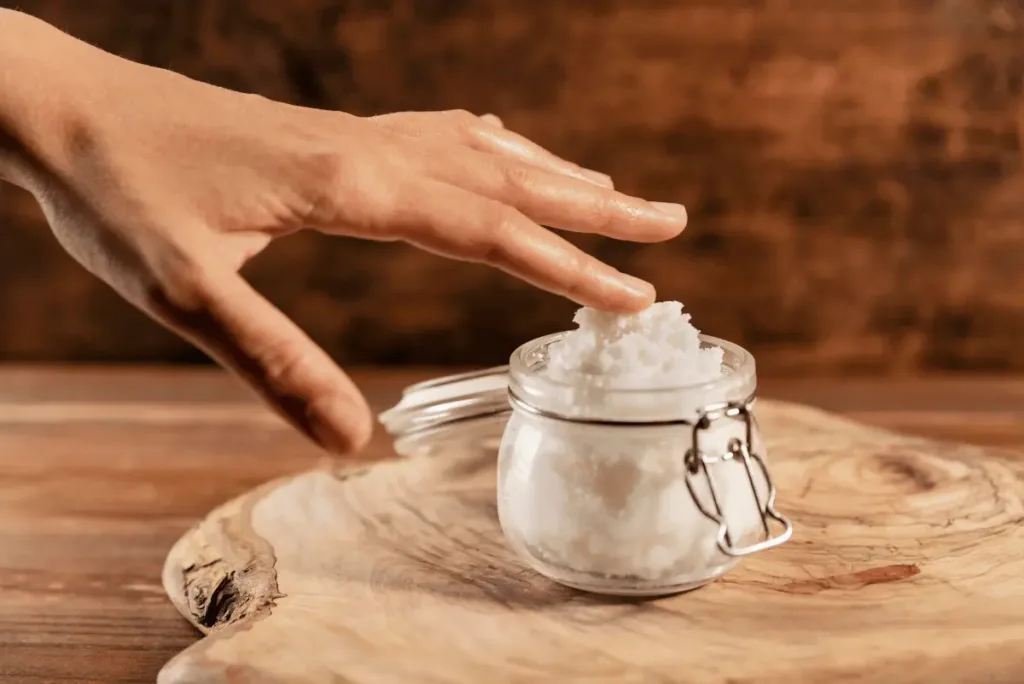Eczema, as many of us know, can be a stubborn and relentless skin condition. Over the years, I’ve tried a multitude of products and remedies, some with limited success and others with no effect at all.
I stumbled upon kokum butter recently, and the question that comes to mind is; Is kokum butter good for eczema?
Yes, kokum butter’s fatty acids, antioxidants, and anti-inflammatory compounds help soothe and moisturize dry, irritated skin commonly associated with eczema. However, individual responses to skincare products vary.
If it proves suitable for your skin, incorporate it into your daily skincare routine or drop it immediately if it doesn’t.
This article will discuss kokum butter and its potential benefits for eczema-prone skin. Plus, I’ll give you practical tips on how to incorporate kokum butter into your skincare routine safely.
What Does Kokum Butter Do to Eczema?

Kokum butter offer several benefits for eczema-prone skin due to its unique properties and composition. Here’s a list of what kokum butter does for eczema:
1. It alleviates dryness that could further trigger eczema
Kokum butter is rich in fatty acids, especially stearic and oleic acids, which help lock in moisture. This deep hydration can alleviate the dryness and flakiness often associated with eczema. It acts as a natural emollient, leaving your skin soft and supple.
2. Provides relief and comfort
Eczema is characterized by inflammation, and kokum butter contains compounds like garcinol and antioxidants that possess anti-inflammatory properties. These can help calm the redness, itching, and swelling associated with eczema, providing relief from discomfort.
3. It contains vitamins that help control eczema
Kokum butter is packed with antioxidants, such as vitamin E and polyphenols. These antioxidants help combat free radicals that can exacerbate eczema symptoms. By reducing oxidative stress, kokum butter can contribute to the overall health of your skin.
4. Supports skin barrier
Eczema often damages the skin’s natural barrier, making it more susceptible to irritants and allergens. Kokum butter’s fatty acids help strengthen this barrier by replenishing essential lipids, allowing your skin to defend itself against external aggressors better.
5. Prevents trans-epidermal water loss
Kokum butter creates a protective layer on the skin’s surface, reducing the loss of moisture through evaporation. This barrier function can help keep your skin adequately hydrated, which is crucial for eczema management.
6. Soothes itching and irritation
The soothing properties of kokum butter can provide relief from the itching and irritation that eczema often brings. Its emollient nature can calm the skin, making it less prone to scratching, which can worsen eczema symptoms.
7. Promotes skin regeneration
Kokum butter contains vitamin A, which supports skin cell regeneration. This can be beneficial for individuals with eczema, as it helps in the healing process of damaged skin and can potentially reduce scarring.
8. It promotes skin breathability
Kokum butter has a low comedogenic rating, meaning it’s less likely to clog pores. This quality is essential for those with eczema-prone skin, as clogged pores can worsen the condition.
9. Gentle and hypoallergenic
Kokum butter is generally well-tolerated by most skin types and is less likely to trigger allergies or sensitivity. This makes it a suitable choice for individuals with sensitive or eczema-prone skin.
10. Natural and chemical-free
Kokum butter is a natural product derived from the seeds of the kokum tree, making it an attractive option for those seeking chemical-free skincare solutions. It lacks the harsh chemicals and preservatives often found in commercial products.
Step-By-Step Guide on How to Use Kokum Butter Effectively
Using kokum butter for eczema is a straightforward process. Here’s a step-by-step explanation of how to use it effectively:
Step 1: Cleanse your skin
- Start by washing your hands thoroughly with a mild soap or cleanser. Ensure that your hands are clean before touching your eczema-affected skin.
- If your eczema covers a larger area, consider taking a gentle, lukewarm bath or shower to cleanse your body. Avoid using hot water, as it can further dry out your skin.
Step 2: Pat your skin dry
Gently pat your skin dry with a clean, soft towel or cloth. Avoid rubbing, as this can irritate your eczema-prone skin.
Step 3: Scoop out kokum butter
Use clean, dry hands to scoop out a small amount of kokum butter from its container. Start with a pea-sized amount for a small area or adjust as needed for larger affected areas.
Step 4: Warm the kokum butter
Rub the kokum butter between your clean palms to warm it up. Kokum butter is solid at room temperature, but it will melt on contact with your skin.
Step 5: Apply gently
- Gently apply the warmed kokum butter to the affected areas of your skin. Use light, circular motions to ensure even coverage.
- Be particularly attentive to areas with severe eczema symptoms, such as patches of redness, dryness, or itching. Apply a slightly thicker layer to these areas if necessary.
Step 6: Massage in
- As you apply the kokum butter, you can gently massage it into your skin. This promotes better absorption and circulation.
- Pay extra attention to areas where you tend to experience the most discomfort.
Step 7: Allow absorption
- Let the kokum butter absorb into your skin. It may take a few minutes for it to penetrate and provide relief fully.
- Avoid dressing immediately to prevent smudging or rubbing off the kokum butter.
Step 8: Reapply as Needed
Depending on the severity of your eczema, you may need to reapply kokum butter throughout the day. It’s best to apply it at least once in the morning and once at night, but you can adjust based on your skin’s needs.
6 Potential Side Effects of Kokum Butter
While kokum butter is generally considered safe for most skin types, there are potential side effects and allergies to be aware of when using it for eczema or any other skincare purpose. Here are some important points to keep in mind:
1. Can trigger allergic reactions
Individuals with nut allergies should exercise caution when using kokum butter, as it is derived from the seeds of the kokum tree, which is related to mangosteen. If you experience any signs of an allergic reaction, discontinue use immediately and consult a healthcare professional.
2. Can potentially clog pores if used in excess
While kokum butter is non-comedogenic, meaning it’s less likely to clog pores, it’s still important to be mindful of how your skin responds to it. Some individuals may find that kokum butter feels heavy on their skin, especially if applied in excessive amounts.
3. Sensitivity to heat
Kokum butter has a melting point slightly below body temperature. If stored in a warm environment or exposed to high temperatures, it can become soft or melt. Be cautious when handling kokum butter in hot weather to prevent spillage and ensure proper storage.
4. Interaction with other skincare products can cause adverse effect
If you’re using other topical treatments or medications for your eczema, consult with a dermatologist before incorporating kokum butter into your routine. There may be potential interactions or adverse effects when combining different products.
5. Personal sensitivity
Everyone’s skin is unique, and what works well for one person may not work for another. Pay attention to how your skin reacts to kokum butter and make adjustments accordingly. If you notice any unexpected changes in your skin’s condition, consult a healthcare professional.
6. Excessive use is detrimental
Using an excessive amount of kokum butter on your skin may not yield better results and could potentially lead to skin feeling greasy or heavy. Start with a small amount and adjust as needed.
Is Kokum Butter Good for Sensitive Skin?
Yes, kokum butter is generally suitable for sensitive skin due to its hypoallergenic nature and gentle, non-comedogenic properties. It’s less likely to cause irritation or clog pores, making it a safe option for individuals with sensitive skin.
However, as with any skincare product, it’s advisable to perform a patch test to ensure compatibility and monitor for any adverse reactions.
Is kokum butter good for skin allergy?
Kokum butter is generally a suitable option for individuals with allergy-prone skin.
Can kokum reduce itching?
Yes, kokum butter can help reduce itching thanks to its anti-inflammatory and moisturizing properties. It can soothe irritated skin, alleviate dryness, and provide relief from itching commonly associated with skin conditions like eczema and dermatitis.
Conclusion
Kokum butter is good for eczema due to its composition of fatty acids, antioxidants, and anti-inflammatory properties. Kokum butter not only soothes the itch or redness; kokum butter goes deeper, working to restore your skin’s natural barrier, and generally cares for you in a way that suits even the most sensitive skin.
As you consider incorporating kokum butter into your eczema routine, remember that individual experiences may vary. It’s crucial to perform a patch test and monitor how your skin responds.






